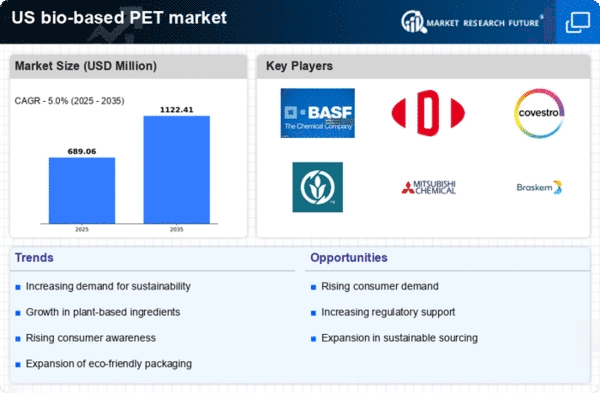The bio based-pet market is currently characterized by a dynamic competitive landscape, driven by increasing consumer demand for sustainable products and regulatory pressures aimed at reducing carbon footprints. Key players such as BASF SE (Germany), DuPont de Nemours Inc (US), and NatureWorks LLC (US) are strategically positioned to leverage innovation and sustainability in their operations. BASF SE (Germany) focuses on developing advanced bioplastics, while DuPont de Nemours Inc (US) emphasizes partnerships to enhance its bio-based offerings. NatureWorks LLC (US) is dedicated to expanding its production capacity for Ingeo biopolymer, which is derived from renewable resources. Collectively, these strategies not only enhance their market presence but also contribute to a more sustainable competitive environment.In terms of business tactics, companies are increasingly localizing manufacturing to reduce supply chain vulnerabilities and optimize logistics. The market structure appears moderately fragmented, with several players vying for market share while also collaborating on sustainability initiatives. This collective influence of key players fosters a competitive yet cooperative atmosphere, where innovation and sustainability are paramount.
In October BASF SE (Germany) announced a partnership with a leading automotive manufacturer to develop bio-based components for vehicle interiors. This strategic move is significant as it aligns with the automotive industry's shift towards sustainable materials, potentially enhancing BASF's market share in the automotive sector while promoting eco-friendly practices. The collaboration is expected to yield innovative solutions that meet both performance and environmental standards.
In September DuPont de Nemours Inc (US) launched a new line of bio-based polymers aimed at the packaging industry. This initiative is crucial as it addresses the growing demand for sustainable packaging solutions, positioning DuPont as a leader in the transition towards circular economy practices. The introduction of these polymers is likely to attract environmentally conscious consumers and businesses, thereby expanding DuPont's market reach.
In August NatureWorks LLC (US) completed an expansion of its biopolymer production facility, increasing its capacity by 30%. This expansion is pivotal as it enables NatureWorks to meet the rising demand for sustainable materials across various industries, including food and beverage packaging. The increased capacity not only strengthens NatureWorks' competitive position but also underscores the growing importance of bio-based products in the market.
As of November current competitive trends indicate a strong emphasis on digitalization, sustainability, and the integration of AI technologies within the bio based-pet market. Strategic alliances are increasingly shaping the landscape, allowing companies to pool resources and expertise to drive innovation. Looking ahead, competitive differentiation is likely to evolve from traditional price-based competition to a focus on technological advancements, sustainability, and supply chain reliability. This shift suggests that companies that prioritize innovation and sustainable practices will be better positioned to thrive in the evolving market.
















